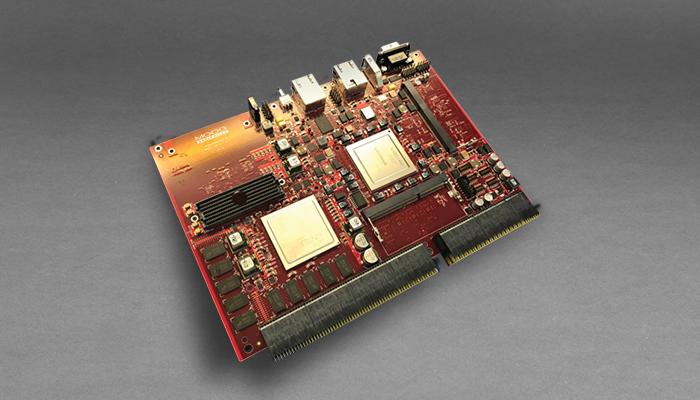Rad Tolerant, 150 GFLOP DSP SpaceVPX Single Board Computer

Jump To:
Features
Literature
Related
Overview
Moog has invested significantly in components, architectures, and automated manufacturing equipment to provide state-of-the-art, radiation tolerant data processing and storage solutions for the space market. Components selected, sourced, and tested for radiation resiliency from single lot date code procurements.
The Bandera series of 3U and 6U SpaceVPX Single Board Computers (SBC) provides over 150 GFlops of DSP processing power for your application. Coupled with a high performance FPGA and advanced memories, the SBC supports simultaneous ingest and egress rates over 100 Gbps.
Bandera SBCs can be integrated into a Solid State Recorder (SSR) Sub-System to provide optimized, localized data processing within the SSR platform.
Features
- Multi-Core DSP System-on-Chip (SoC)
- >150 GFlops performance
- >1 GHz operating frequency
- >24 GBytes DDR memory w/ ECC
- >48 GBytes FLASH w/ ECC
- >100 Gbps ingest rate (optical or copper)
- >100 Gbps egress rate (optical or copper) •
- Modern radiation tolerant FPGA
- 12 SERDES lanes to front panel (>10 Gbps per lane)
- Radiation Tolerant – 50KRad TID, SEL immune to 75 MeV
- SpaceVPX (VITA 78), 3U and 6U
- Ruggedized VITA REDI, conduction cooled
- LEO to GEO mission orbits
- Flexible core and peripheral power control
- VxWorks and Linux OS support
- Middleware fault mitigation support
- Ethernet for SW development and test
- Optional ARM A72 multicore processor available
Applications
- EO, IR, and RF sensor data processing
- Software defined radio
- Data compression
- Communications
- Artificial Intelligence/Machine Learning

